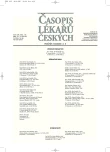Cognitive Functions Impairment in Diabetes Mellitus Patient
Poruchy kognitivních funkcí u pacientů s diabetes mellitus
V posledních letech dochází ke zvýšenému zájmu o výzkum vztahu diabetes mellitus k demenci či poklesu kognitivních funkcí. Z poměrně bohatých literárních zkušeností vyplývá, že diabetes mellitus sám o sobě způsobuje narušení kognitivních funkcí, a to bez ohledu faktoru věku či skutečnosti, zda se jedná o diabetes mellitus 1. nebo 2. typu. Diabetes mellitus 1. typu způsobuje zpomalení psychomotorického tempa, zatímco u diabetes mellitus 2. typu je spíše popisováno narušené ukládání nových informací. Přesný mechanizmus, jakým diabetes vede k narušení kognice, není však dosud dostatečně objasněn. V současnosti je však již známo několik hypotetických mechanizmů, které by mohly vysvětlovat vztah mezi diabetem a narušenou úrovní kognitivních funkcí. Další výzkum, zaměřený zejména na průběhové klinicko–zobrazovací či klinicko–patologické studie, je nezbytný k objasnění přesných etiopatogenetických mechanizmů stojících na pozadí vztahu diabetes mellitus a demence. Pro klinickou praxi je pak důležité si uvědomit, že prevence, včasná diagnostika a optimální léčba diabetu může vést ke snížení výskytu demence či narušení kognitivních funkcí.
Klíčová slova:
diabetes mellitus, demence, kognice, porucha.
Authors:
R. Přikryl
Authors‘ workplace:
Psychiatrická klinika LF MU a FN, Brno
Published in:
Čas. Lék. čes. 2007; 146: 434-437
Category:
Review Article
Overview
An increased research interest in the relation between diabetes mellitus and dementia or deterioration of cognitive functions has been recently noticed. The relatively rich scientific literature in this topic shows that diabetes mellitus itself can cause an impairment of cognitive functions regardless patient’s age or the fact whether he has type 1 or type 2 diabetes mellitus. Type 1 diabetes mellitus leads to a psychomotor retardation while type 2 diabetes mellitus tends to be associated with impaired storage of new information. The exact mechanism through which diabetes impairs cognition has not been explained sufficiently yet, but several hypothetical mechanisms which might explain the relation between diabetes and impaired cognition have been proposed. To explain the etiopathogenetic mechanisms underlying the relation between diabetes and dementia, further research, especially research focused on process clinical-imaging studies or clinical-pathological studies is necessary. As far as clinical practice is concerned, it is important to bear in mind that prevention, timely diagnosis and optimum treatment of diabetes may help to reduce incidence of dementia or cognitive functions’ impairment.
Key words:
diabetes mellitus, dementia, cognition, impairment.
Labels
Addictology Allergology and clinical immunology Angiology Audiology Clinical biochemistry Dermatology & STDs Paediatric gastroenterology Paediatric surgery Paediatric cardiology Paediatric neurology Paediatric ENT Paediatric psychiatry Paediatric rheumatology Diabetology Pharmacy Vascular surgery Pain management Dental HygienistArticle was published in
Journal of Czech Physicians

- Advances in the Treatment of Myasthenia Gravis on the Horizon
- Possibilities of Using Metamizole in the Treatment of Acute Primary Headaches
- Metamizole at a Glance and in Practice – Effective Non-Opioid Analgesic for All Ages
- Metamizole vs. Tramadol in Postoperative Analgesia
- Spasmolytic Effect of Metamizole
-
All articles in this issue
- Bioequivalence Studies of Pharmaceutical Preparations
- Cognitive Functions Impairment in Diabetes Mellitus Patient
- Stem Cells, Stem Cell Therapy, and Ethical Problems of Medicine
- Present View on the Spinal Haemangioma
- Phototoxic Reaction After the Systemic Administration of Antimicrobial Drugs
- Problems of Regulation of Breathing
- Conjugated Linoleic Acid – The Dietary Supplement in the Prevention of Cardiovascular Diseases
- Transcription Factor Egr-1 in Cardiovascular Biology
- Incidence, Diagnostics and Therapy of the Lung Cancer in the Czech Republic in 2003
- Study of the Eosinophilic Inflammation Activity in Bronchial Asthma
- Composition of the Nonesterified Fatty Acids and Lipid Peroxidation in Metabolic Syndrome
- Prospects of Body Composition Analysis by Bioimpedance Method in Children
- The Assessment of Body Composition in Patients with Thyroid Dysfunction
- Is Prescription of Physical Activity a Part of Health Care in Civilization Disorders? Results of Questionnaire Study in Medical Doctors
- Stress Cardiomyopathy
- Journal of Czech Physicians
- Journal archive
- Current issue
- About the journal
Most read in this issue
- Bioequivalence Studies of Pharmaceutical Preparations
- Study of the Eosinophilic Inflammation Activity in Bronchial Asthma
- Stress Cardiomyopathy
- Is Prescription of Physical Activity a Part of Health Care in Civilization Disorders? Results of Questionnaire Study in Medical Doctors
